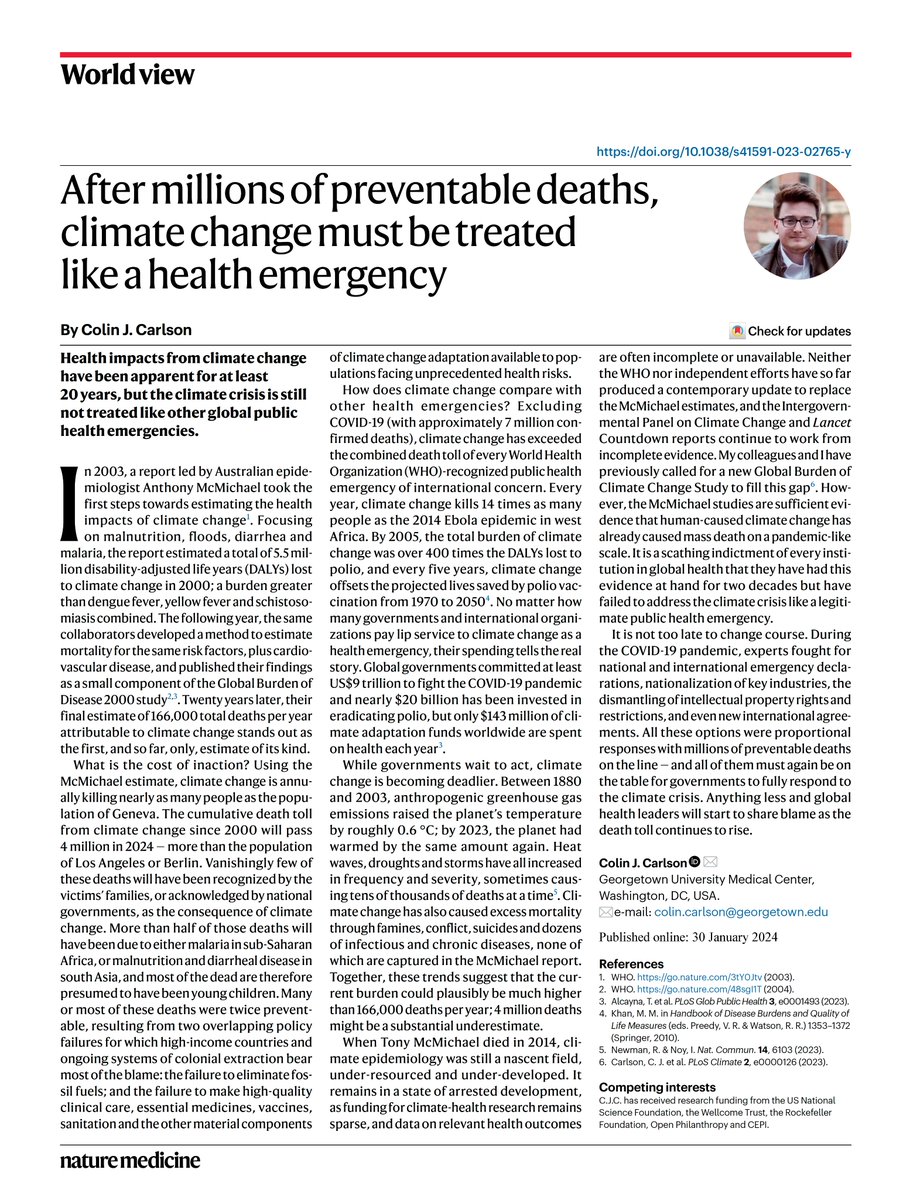I'm an author on the new #ipcc report and I study the connections between climate change and emerging diseases. 🧵: is climate change connected to Covid? Could it cause more pandemics? Here's some of what the report says. (And also my own shameless thoughts)
You probably know that wildlife trade, agriculture, and deforestation are all driving disease emergence. But the new #ipcc impacts report shows that climate change is the backdrop for all of that. (Ch. 2, p. 41) 

There's a great FAQ in chapter 2: "How does climate change increase the risk of diseases?" The short version: climate change is transforming every aspect of ecosystems. Growing human-wildlife contact gives that a chance to play out in human health. 



(Shameless plug: it's still just a preprint, but if you want to read more about how climate change will reshuffle the global virome in animals, we've got a great @viralemergence study on bioRxiv that talks about these changes!)
biorxiv.org/content/10.110…
biorxiv.org/content/10.110…
The problem is that it's incredibly hard to actually document the human health impacts of climate change. Almost all of our evidence is about vector-borne and diarrheal disease. See this from the heath chapter (Ch. 7): 

This is partly because those are some of the diseases that matter most on the frontline of climate impacts - which is great. But it's also because these are the impacts that are the most directly related to climate hazards (easier to attribute, but not necessarily higher burden)
When it comes to zoonotic diseases (those that start in animals - like Ebola, SARS, or influenza), things get more muddled and multicausal, and the evidence base becomes murkier. 

We desperately need to close that "attribution gap". Even for vector-borne and diarrheal diseases, we're lagging way behind methodologically. Take this stunning figure - this framework is *ancient* in climate years. It dates back to a 2004 study!
apps.who.int/iris/handle/10…

apps.who.int/iris/handle/10…


(Another shameless plug: developing methods to solve this attribution problem is what my own personal research has focused on for the last few years! e.g., this study on growing plague risk. Another *very* cool preprint coming on this in a couple weeks.)
onlinelibrary.wiley.com/doi/full/10.11…
onlinelibrary.wiley.com/doi/full/10.11…
So how about attribution for the health burdens of a pandemic? Does climate change shape human-to-human transmission?
Respiratory viruses can be very climate-sensitive, but we don't have a great sense of the net impact on flu, and human behavior is often more important (as it was with Covid). Still work to do here, but changes in spillover probably more important. (p. 7-32, 7-33) 



The biggest lessons from COVID-19 in this report are about how we handle life in a time of crisis. There's tons in Chapter 7 and elsewhere, so I'll just stick to this key message (p. 7-7) 

(Final shameless plug: we wrote last year about how emergency response on the pandemic would crash into climate change impacts. Interesting to revisit in retrospect nature.com/articles/s4155…) 

So, in summary:
🦇 ecosystem changes impact disease spillover
🦟 we know the most about vector-borne and diarrheal disease
📈 we need better ways to identify more complicated impacts on infectious disease
🏥 social vulnerability matters; health system strengthening is adaptation
🦇 ecosystem changes impact disease spillover
🦟 we know the most about vector-borne and diarrheal disease
📈 we need better ways to identify more complicated impacts on infectious disease
🏥 social vulnerability matters; health system strengthening is adaptation
But don't take my word for it:
https://twitter.com/wormmaps/status/1498262090016043012
• • •
Missing some Tweet in this thread? You can try to
force a refresh






